SCVIi078-A
General
Cell Line |
|
| hPSCreg name | SCVIi078-A |
| Cite as: | SCVIi078-A (RRID:CVCL_C7YG) |
| Cell line type | Human induced pluripotent stem cell (hiPSC) |
| Similar lines |
UKKi007-A (NP0014-6, UKK007Ai) Donor's gene variants: RYR2, RYR2 Donor diseases: Catecholaminergic polymorphic ventricular tachycardia UKKi007-B (NP0014-5) Donor's gene variants: RYR2 Donor diseases: Catecholaminergic polymorphic ventricular tachycardia TAUi005-A (UTA.14511.CPVT) Donor's gene variants: RYR2 Donor diseases: Catecholaminergic polymorphic ventricular tachycardia TAUi004-A (UTA.05208.CPVT) Donor's gene variants: RYR2 Donor diseases: Catecholaminergic polymorphic ventricular tachycardia FAMRCi005-A (LMNA B4) Donor's gene variants: LMNA Donor diseases: myopathy atrioventricular block Paroxysmal ventricular tachycardia FAMRCi005-B (LMNA B5) Donor's gene variants: LMNA Donor diseases: myopathy atrioventricular block Paroxysmal ventricular tachycardia SCVIi073-A (SCVIi574C2) Donor's gene variants: titin, BAG cochaperone 3, BAG cochaperone 3 Donor diseases: Dilated Cardiomyopathy SCVIi074-A (SCVIi599C1) Donor's gene variants: BAG cochaperone 3 Donor diseases: Hypertrophic Cardiomyopathy FAMRCi006-A (LMNA T3) Donor's gene variants: LMNA Donor diseases: Emery-Dreifuss Muscular Dystrophy Dilated Cardiomyopathy FAMRCi006-B (LMNA T4) Donor's gene variants: LMNA Donor diseases: Emery-Dreifuss Muscular Dystrophy Dilated Cardiomyopathy ZJSHi001-A (ZJSHi-KCNB1) Donor's gene variants: KCNB1 Donor diseases: developmental and epileptic encephalopathy, 26 |
| Last update | 12th August 2023 |
| User feedback | |
Provider |
|
| Generator | Stanford Cardiovascular Institute (SCVI) |
| Owner | Stanford Cardiovascular Institute (SCVI) |
| Distributors | |
| Derivation country | United States |
External Databases |
|
| Cellosaurus | CVCL_C7YG |
| BioSamples | SAMEA114260510 |
| Wikidata | Q123033418 |
General Information |
|
| Publications | |
| * Is the cell line readily obtainable for third parties? |
Yes Research use: allowed
Clinical use: not allowed
Commercial use: not allowed
|
Donor Information
General Donor Information |
|
| Sex | female |
| Ethnicity | Non-Hispanic or Latino |
Phenotype and Disease related information (Donor) |
|
| Diseases | A disease was diagnosed.
|
External Databases (Donor) |
|
| BioSamples | SAMEA114260511 |
Ethics
| Has informed consent been obtained from the donor of the embryo/tissue from which the pluripotent stem cells have been derived? | Yes |
| Was the consent voluntarily given? | Yes |
| Has the donor been informed that participation will not directly influence their personal treatment? | Yes |
| Can you provide us with a copy of the Donor Information Sheet provided to the donor? | No |
| Do you (Depositor/Provider) hold the original Donor Consent Form? | Yes |
| Please indicate whether the data associated with the donated material has been pseudonymised or anonymised. | pseudonymised |
| Does consent explicitly allow the derivation of pluripotent stem cells? | Yes |
| Does consent prevent CELLS DERIVED FROM THE DONATED BIOSAMPLE from being made available to researchers anywhere in the world? | Yes |
| How may genetic information associated with the cell line be accessed? | Controlled Access |
| Will the donor expect to receive financial benefit, beyond reasonable expenses, in return for donating the biosample? | No |
| Has a favourable opinion been obtained from a research ethics committee, or other ethics review panel, in relation to the Research Protocol including the consent provisions? | No |
| For generation of the cell line, who was the supplier of any recombined DNA vectors or commercial kits used? |
hIPSC Derivation
General |
|
| Source cell type |
A peripheral blood cell with a single nucleus. This category includes lymphocytes and monocytes.
Synonyms
|
Reprogramming method |
|
| Vector type | Non-integrating |
| Vector | Sendai virus |
Vector free reprogramming |
|
Other |
|
| Derived under xeno-free conditions |
Unknown |
| Derived under GMP? |
Unknown |
| Available as clinical grade? |
Unknown |
Culture Conditions
| Medium |
StemPro® hESC SFM
|
Characterisation
Analysis of Undifferentiated Cells
| Marker | Expressed | Immunostaining | RT-PCR | Flow Cytometry | Enzymatic Assay | Expression Profiles |
| SOX2 |
Yes |
|||||
| NANOG |
Yes |
|||||
| POU5F1 (OCT-4) |
Yes |
Method documentation
Differentiation Potency
Genotyping
Karyotyping (Cell Line) |
|
| Has the cell line karyotype been analysed? |
Yes
|
Other Genotyping (Cell Line) |
|

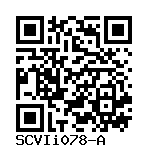
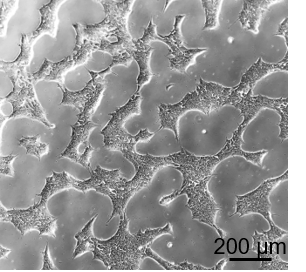
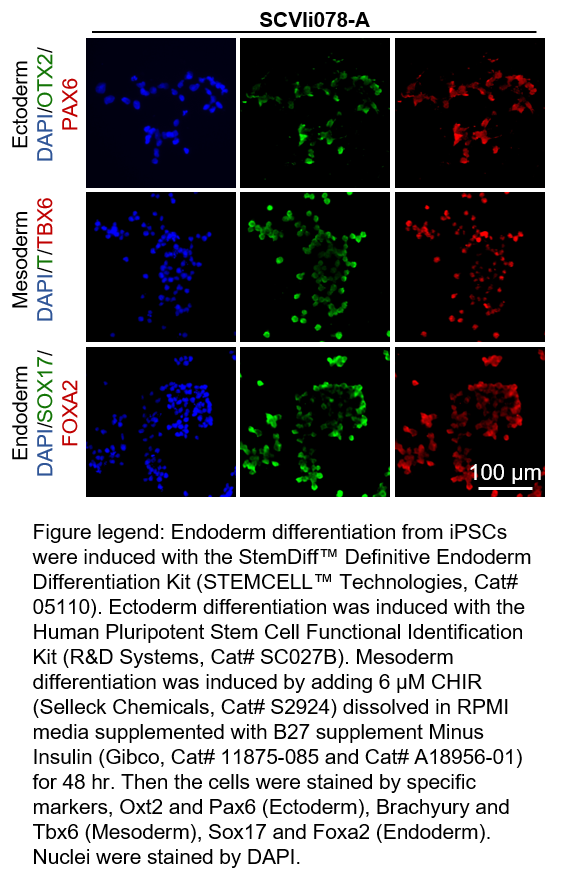
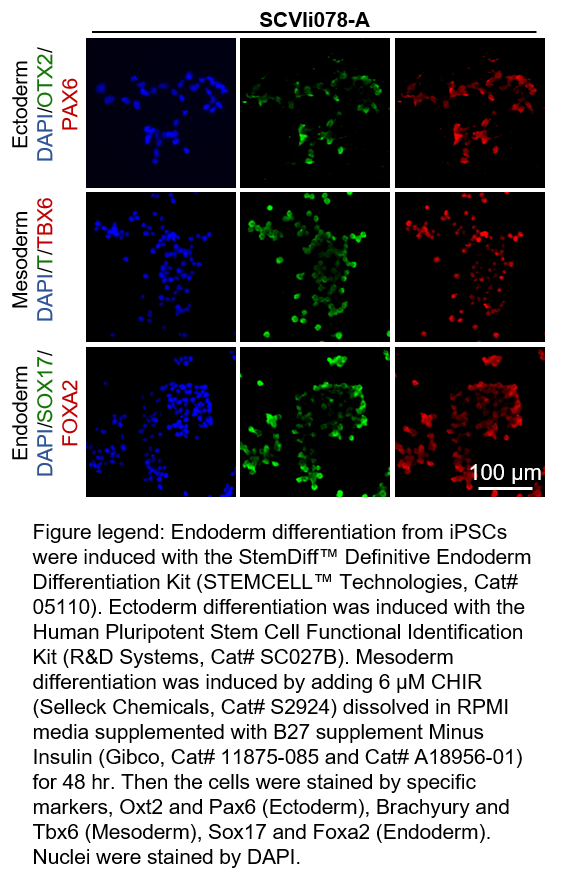
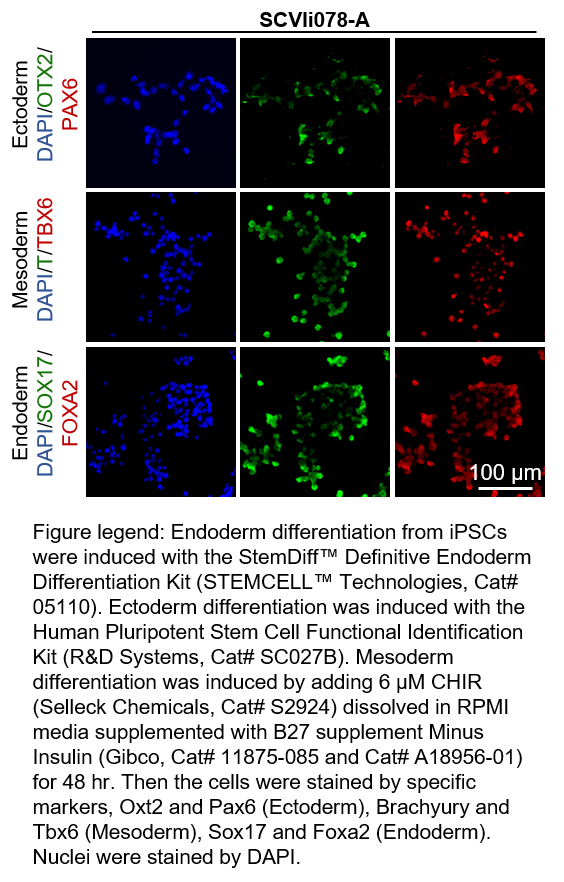
Login to share your feedback, experiences or results with the research community.